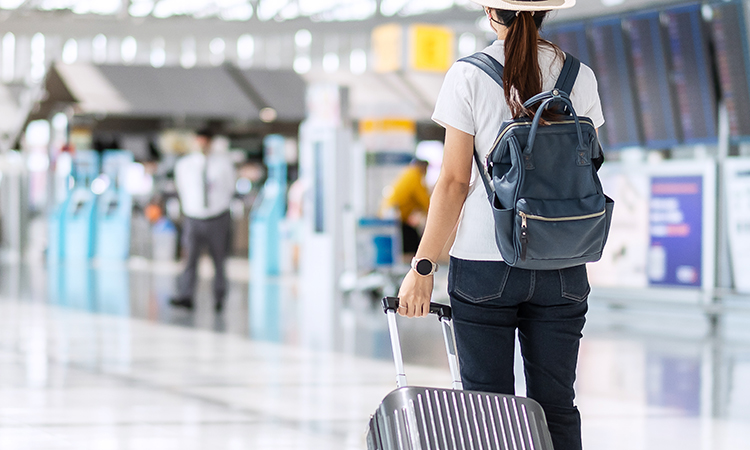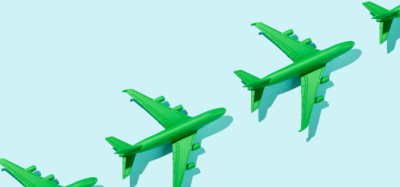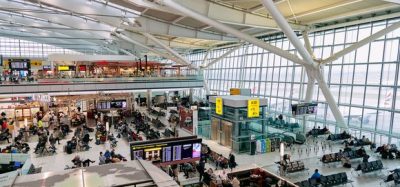Confronting the risk of an uneven global recovery
- Like
- Digg
- Del
- Tumblr
- VKontakte
- Buffer
- Love This
- Odnoklassniki
- Meneame
- Blogger
- Amazon
- Yahoo Mail
- Gmail
- AOL
- Newsvine
- HackerNews
- Evernote
- MySpace
- Mail.ru
- Viadeo
- Line
- Comments
- Yummly
- SMS
- Viber
- Telegram
- Subscribe
- Skype
- Facebook Messenger
- Kakao
- LiveJournal
- Yammer
- Edgar
- Fintel
- Mix
- Instapaper
- Copy Link
Posted: 12 July 2021 | Luis Felipe de Oliveira | No comments yet
For International Airport Review, Luis Felipe de Oliveira, Director General of Airports Council International (ACI) World, discusses how there is no one-size-fits-all solution approach to recovery and that it will require heightened levels of collaboration and partnership among industry stakeholders in order to ensure success.


We continue to make positive incremental steps towards rebuilding global connectivity and returning aviation to the pathway of growth that we collectively established before the COVID-19 pandemic.
As the aviation industry navigates a sustained global restart from the restrictions imposed as a result of the pandemic, however, the risk of a disjoined and inconsistent recovery is still present
This is crucial for the global economy and the communities that we serve, as the air transport industry is responsible for around nine per cent of global Gross Domestic Product (GDP), with the catalytic effect that airlines, airports and other players of the industry produce.
As the aviation industry navigates a sustained global restart from the restrictions imposed as a result of the pandemic, however, the risk of a disjoined and inconsistent recovery is still present.
The lack of coordination among governments remains one of our biggest concerns. It has been very difficult to sustain an industry restart with this uncoordinated approach, which, in turn, affects passengers’ confidence. Passengers will only be willing to travel, however, if the rules are clear and harmonised across different countries.
Collaboration, cooperation and consistency remain key for recovery
Aviation has always been an interconnected and interdependent ecosystem, and recovery will require heightened levels of collaboration and partnership among industry stakeholders.
During the crisis, the collaborative approach among all participants in the aviation ecosystem has increased
It is clear to me that, during the crisis, the collaborative approach among all participants in the aviation ecosystem has increased.
Airports during the pandemic supported the industry with waivers in parking fees, increasing the credit terms for airlines and supporting the airline community with various measures. In addition, airports, despite the lack of movements, maintained operations to receive repatriation flights; cargo flights with goods, medicines and medical equipment to help to cope with the pandemic; and, most recently, supporting the transport of the vaccines.
Most airports in the world are providing incentives to airlines for the comeback of operations, because, without passengers, airports will not return to financial health.
Investment in recovery and returning to growth
If we look at our industry before the pandemic, two-thirds of airports were incurring losses. Now, all of them are facing substantial losses, because around 60 per cent of airports’ income comes from passengers.
These unprecedent losses could affect our future investments to cope with the return of the demand and future growth.
To help us to meet these challenges, we need to recognise that the airport industry is actually, overall, extremely cost-effective.
In the pre-pandemic years, the evolution of industry costs was modest: airport costs grew at a slower pace than global air traffic demand, despite significant investments, increasing service quality and reorientation towards environmentally sustainable operations. This controlled growth was a testament to the sustainable cost management strategy implemented by the industry.
In times of crisis, airport costs are difficult to adjust and, in addition, the lack of government support to airports has a huge impact on our finances
In times of crisis, airport costs are difficult to adjust and, in addition, the lack of government support to airports has a huge impact on our finances. The airport industry is highly asset-intensive and characterised by high fixed costs that are necessary for maintaining and operating airport infrastructure, such as runways, taxiways, aprons, parking stands and terminal buildings. Airlines have a flexibility to adjust their fleet that airports do not enjoy when it comes to resizing infrastructure.
That said, airports of all sizes throughout the world have embarked upon drastic cost containment plans to counter the sudden impact on their revenues. As traffic declined, airports’ ability to collect airport charges or generate commercial revenues decreased proportionally. With little flexibility in operating expenditures coupled with capital costs that are largely fixed, the current crisis represents an unprecedented challenge for the airport industry’s financial viability.
Rethinking the structure of airport charges and collaborating on slots
We believe that the crisis provides us with an opportunity to rethink the structure of airport charges. Rather than the highly regulated approach, we should explore a lighter touch approach based on the market and negotiations between airlines and airports, improving the use of infrastructure and benefiting passengers with more options to fly.
We believe that the crisis provides us with an opportunity to rethink the structure of airport charges”
There is definitely no one-size-fits-all solution to the question of slot relief. Some markets do not require strong slot alleviation measures anymore, while some others do. The specific circumstances of each market should be taken into consideration.
I am pleased that true industry collaboration, that we now see through the Worldwide Airport Slot Board (WASB), has resulted in recommendations for the Northern Winter 2021 season that recognise that different countries and regions are recovering at different rates and that regulators should adapt the recommendation to the circumstances and needs of their local market.
The WASB recommendation is a useful global reference. We support it because of its flexibility and recognition that policy must respond to local needs. The European Union (EU) decided that it will reinstate slot usage requirements, though at a lower threshold than 80:20. Airports support this approach for the EU.
The efficient use of airport slots will be key to provide better options for passengers in the future. Aviation cannot afford to keep unused slots, as this will result in higher cost to the industry.
The best use of infrastructure is key to providing a better service for the communities that we serve. At the end of the day, we need to find a way that benefits both airlines and airports but, first and foremost, passengers.
Breaking down the barriers to a harmonised recovery
We are seeing the biggest vaccination campaign in the world.
Billions of doses have already been deployed in different parts of the world, but recovery will not take-off without a coordinated and globally consistent approach to vaccination and testing, coupled with safe and interoperable methods of sharing testing and vaccination information.
Recovery will not take-off without a coordinated and globally consistent approach to vaccination and testing, coupled with safe and interoperable methods of sharing testing and vaccination information”
This means that the way that we work together as an industry to prioritise the welfare of passengers will continue to evolve in response to the effects of the pandemic.
We welcome the approach taken by the International Civil Aviation Organization (ICAO) through the Council Aviation Task Force (CART), which included representatives from the industry at a high level and every step of the way through the decision-making process: this truly is a model for future ICAO industry cooperation.
We will also be urging governments to take a risk-based approach to provide a predictable roadmap, or flight plan, to reopening. We have to use all of the tools that we have available and, most importantly, interoperable health certificates to provide evidence of vaccine, testing or recovery to enable people to travel safely and with the minimum of delay.
What we have learned from this crisis is the importance of working together – regulators, industry, international organisations – to show us that there is not just one way of doing business, and that we need to be flexible.
We need a performance-based approach based on the best information available and a well thought-through risk assessment as to how we get there.
Airports are vital focal points of the aviation ecosystem
Airports can play a key coordinating role in this effort, as they provide a unique and essential service in connecting people and business and in supporting the sustainable social and economic development for the communities that we serve.
Around 60 per cent of all of those employed in the aviation industry are at airports, and the key government services needed to coordinate the return of operations and the incorporation of new health and safety measures are located at the airport, as well.
Airports can take a leadership role with their partners to help to bring that consistency that is needed to ensure a harmonised recovery”
Airports can take a leadership role with their partners to help to bring that consistency that is needed to ensure a harmonised recovery. For Airports Council International’s (ACI) part, we work closely with our members around the world to help to bring that global coordination and consistency that will ensure an even and sustained recovery.
Aligned with ICAO’s guidance, we have produced a comprehensive Aviation Business Restart and Recovery publication, free for our members, that sets out globally-harmonised assistance on every aspect of airport operations. We also introduced the Airport Health Accreditation (AHA) programme, which allows airports to ensure that their health and safety measures are aligned with the ICAO-endorsed global standards, along with the Check & Fly app.
We must not lose sight of the long-term challenges
As the industry works now to re-establish the long-term sustainable growth trajectory, it must do so with the future in mind – committing to a net zero future now will make airport operations more cost-efficient and resilient and ensure the best possible chance of long-term success.
Failure or inaction to decarbonise now will be costly and halt future capacity for sustainable growth”
Failure or inaction to decarbonise now will be costly and halt future capacity for sustainable growth. As seen throughout this pandemic, some countries offering government support in the context of COVID-19 have included climate-related actions to be met as part of securing funds.
ACI World has recently announced the long-term carbon goal for the world’s airports, targeting net zero carbon emissions by the year 2050. We are working hard, and some of these airports are reaching this goal even earlier, such as Swedavia in Sweden reaching net zero already and several other airports in the world targeting net zero before 2050.
The next five years will be crucial. As the industry recovers, our attention needs to be focused on infrastructure and sustainability to cope with our positive view that the industry will double in size by 2040.
Stronger together
Airports provide a unique and essential service in connecting people and business and in supporting the sustainable social and economic development for the communities we serve.
We are stronger together, and airlines and airports have to play a key cooperative role in recovery and the long-term development of the industry”
I believe that ACI’s role is as a key influencer and driver of change in our industry. We know that global collaboration between us and the other representatives of the aviation ecosystem – especially with ICAO, the International Air Transport Association (IATA) and our other valued global partners – will be essential for the industry to successfully sustain a balanced recovery and beyond.
We want to work with all of our partners to support the industry, and this will be a key element for our success.
We are stronger together, and airlines and airports have to play a key cooperative role in recovery and the long-term development of the industry.
Luis Felipe de Oliveira commenced his role as Director General of Airports Council International (ACI) World on 1 June 2020.
Prior to ACI, he successfully led the Latin American and Caribbean Air Transport Association (ALTA) as Executive Director and CEO from October 2017 to May 2020, establishing very positive changes within the organisation. Before joining ALTA, de Oliveira served as Vice-President of Supply Development for Latin America and the Caribbean at World Fuel Services (WFS), where he was responsible for improving WFS’ aviation fuel business in the region. For 10 years, de Oliveira worked at the International Air Transport Association’s (IATA) Switzerland office, leading fuel and airport campaigns with governments, oil companies, fuel service providers and airports for the Americas, Africa and the Middle East regions. Additionally, he served 12 years at Shell (based in Brazil and The Netherlands), focusing mainly on Latin America and Caribbean, African and European regions. He has been a Board Member of HERMES Air Transport Organisation since May 2019.
A Chemical Engineer who graduated from the Catholic University of Rio de Janeiro, de Oliveira has vast commercial and technical experience in aviation fuel. He has a postgraduate in Finance from the University of São Paulo, an MBA from Dom Cabral Foundation in São Paulo, and Post-MBA from Kellogg University in Chicago. He is also a member of the International Airport Review Advisory Board.
Related topics
Aeronautical revenue, Airport crisis management, Airside operations, COVID-19, Economy, Funding and finance, Non-aeronautical revenue, Passenger experience and seamless travel, Passenger volumes, Terminal operations
Related organisations
Airports Council International (ACI World), European Union (EU), International Air Transport Association (IATA), International Civil Aviation Organization (ICAO), Worldwide Airport Slot Board (WASB)


















